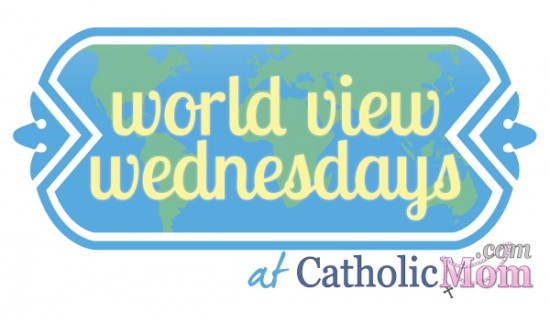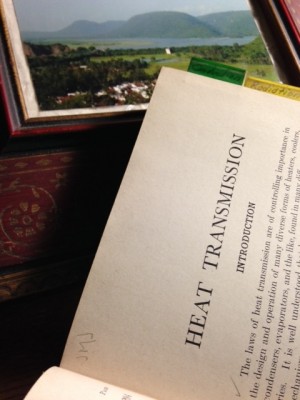
I handle the book gently – it’s an unlikely choice for a writer like myself, and former English major with a concentration in 19th Century English Literature. Called Heat Transmission, by William H. McAdams, Professor of Chemical Engineering at the Massachusetts Institute of Technology, the tome was published in 1942. Drab green and a second edition, it features graphs, charts and formulas like this:
![]()
I run my fingers over the top left corner on page 1, close my eyes and pray. You know when your heart clenches and you marvel at the ferocious ache – and at the strange sweetness in that feeling? Well, it’s like that.
Yesterday, Mom handed me this volume and three others, from Dad’s former office in our home. Inside the front cover, “Joseph Robin” is printed in neat block letters. The chapters are marked by Dad’s hand-labeled plastic tabs: “Conduction,” “Radiation,” and “Dimensionless Groups.”
But for me, the true treasures are etched into the back and front pages in pencil. In back, Dad listed favorite music: “The Soldier’s March from Faust by Gunot,” “Waltz in D Flat by Chopin,” “Minuet by Paderewski.” At the bottom of the list are two that make me smile: “Love is so Sweet in the Springtime,” and “When You’re Pretty and the World is Fair.”
In that upper corner of page 1, Dad printed “JMJ,” dedicating his exploration of Heat Transmission to the hearts of Jesus, Mary, and Joseph.
 My Dad's "JMJ" and the mountains of Andhra Pradesh, India, where Hyderabad (mentioned) is located.
My Dad's "JMJ" and the mountains of Andhra Pradesh, India, where Hyderabad (mentioned) is located.
Dad always said that, from a young age, he wanted to be a strong man of God and raise a good, Catholic family. He never veered from that vision, even when he lost his first wife to a brain embolism, leaving him with four children under age seven. In time, he married a faithful, energetic young nurse and had three more, including me, the youngest.
Dad grew up “Back of the Yards,” next to the Chicago Union Stockyards. He liked to joke that his first words as an infant were, “Get me out of here.”
He served as a radar technician during World War II. Perhaps he studied Heat Transmission to help him in that work. And yet, his focus extended beyond that topic, to fine music and a vision of heaven. Self-improvement, striving toward excellence in work and play, thinking big: these were Dad’s habits. As a boy, his dreams spoke more loudly than thousands of lowing cattle walking the labyrinth to slaughter, and were finer than the smells emanating on summer days, when people sweltered on front stoops or in tiny bungalows.
Dad died July 16, 2014, but not before retelling his stories.
“Write a book,” he urged me. “These words are a part of you.”
As a scrappy young boy, he climbed to the rafters of a building called the “Armory” to fly his hand-built model airplanes. He was ashamed to wear his ratty, old leather jacket to church, and missed his streetcar once, to jump on a kid in the street who made some snide comment about his garb. Dad was Irish-French and could be feisty.
But his parents passed on the Faith, and he served as an altar boy. Sr. Mary Kostka targeted both spirit and studies. She saw greatness in her students and invited Dad and others to meet with her after school and on weekends to drill them in grammar and math. Dad won a full-ride, four-year scholarship to Mount Carmel High School in Chicago, which helped prepare him to become a mechanical engineer. Dad worked overtime and Mom juggled night shifts at the hospital to put all seven of us through Catholic schools. Dad died this summer two weeks shy of age 96, on the Feast of Our Lady of Mount Carmel.
People said of Jesus, “Can anything good come out of Nazareth?” How can such an obscure village produce a great king? Well, how could “Back of the Yards” produce my Dad, who took his wife and kids on wilderness canoe trips into remote Quetico, Canada into his 50’s, and worked until he was 80?
During the Depression era, when people were glad for any job and scrabbled to survive in that stockyards neighborhood, a casual passerby might have eagerly headed toward a nicer neighborhood. Yet on those gritty streets walked a young boy good to know, with bright, intelligent eyes, and dreams to be a great man of God.
Do we generalize and dismiss whole regions, ethnicities and economic groups in our towns and across the world? Do we feed within a subtle bias against those different from us, or the poor? Or do we look beyond Earth’s patchwork of borders and appreciate the vast diversity of cultures and the wide range of personalities within?
Do we recognize that even the humblest have dignity and are good to know? Jesus was poor. His first apostles knew poverty well. The poor are precious to God and should also be precious to us.
After Mom handed me Heat Transmission yesterday, she gave me a clipping from her town newspaper. It told about a woman who never wanted to travel to India, until her husband felt called to go on a mission trip to provide AIDS orphans in Hyderabad dental treatment. The couple had a life-changing experience there, inspired by the devoted care offered castaways in the heart of a teeming city. Their 17-year-old daughter said she “fell in love” with the little orphans, who are shown in a photo with glad eyes, their arms wrapped affectionately around the girl.
We can help ourselves and our children expand beyond textbook lessons of geography, history and current events. In my last “World View Wednesday,” I suggested families draw maps together and learn to pray for world needs.
Here’s an added suggestion. Our continents conveniently distribute themselves over seven days of the week, so why not focus on praying for the needs of a different continent each day? We can show our children the region on a globe or map, read a tidbit of news from the area to focus on a prayer point, and then offer up a special prayer for that intention.
Teaching children that these regions are home to people with unique and precious personalities, can be as easy as pulling stories from missionary magazines such as Maryknoll, St. Anthony’s Messenger, or Catholic Near East, or visiting online news outlets such as Catholic News Agency.
Do a little online searching to explore different regions. Did you ever visit web pages of dioceses overseas? They’re a wealth of information. Visit Vatican web pages and keep up with global church news. Perhaps sponsor a child overseas, and strike up a pen-pal correspondence.
To follow Christ’s call to truly love and serve the poor, we must reach out to family and neighbors, and then open our worldview. To keep motivated in prayer and action for people outside our borders, we have to humanize issues of conflict, natural disaster and poverty.
So, I’m honored to introduce you to my Dad, Joseph -- poor city boy, who, in spite of ragged clothes and rough neighborhood, leaned on God and fulfilled his dreams. On every continent, even in the most remote villages, are boys and girls like him. The light in their eyes can be snuffed out by strife or calamity, so we must care for these little ones, work and pray hard for the spreading of the Faith and peace, respond when our parishes take up mission collections, and take home those cardboard “mite boxes” and fill them.
Let’s all nurture a practical, warm-hearted concern for those deemed worthless by the world, and for the priests, religious and lay missionaries who serve them.
Copyright 2014, Marianna Bartholomew
About the Author

Guest
We welcome guest contributors who graciously volunteer their writing for our readers. Please support our guest writers by visiting their sites, purchasing their work, and leaving comments to thank them for sharing their gifts here on CatholicMom.com. To inquire about serving as a guest contributor, contact editor@CatholicMom.com.


.png?width=1806&height=731&name=CatholicMom_hcfm_logo1_pos_871c_2728c%20(002).png)
Comments